MATC delivers critical services, including tutoring, prepared meals and emergency financial assistance, that keep students in class and on the path to success
With a host of services and programs, MATC has picked up thousands of students when they were down, helped them find their footing, and placed them on the path to success.
Support services are critical to student success, and it is important that institutions actively work to make students aware of these offerings, according to the Community College Enrollment Survey, a study conducted by the nonprofit, nonpartisan think tank New America. Students who didn’t know about support services were more likely to stop going to class. Additionally, students who benefited from support services were more likely to stay in school.
“MATC is committed to finding innovative ways to serve students: food pantries, drop-in child care, dedicated advisors and retention coaches, access to free delivery of groceries, mental health services, and emergency assistance grants,” said MATC President Anthony Cruz, Ed.D. “We want all our students to succeed.”
This is on top of millions of dollars in scholarships awarded each year through the MATC Foundation, the college’s philanthropic partner in student success.
After a long list of false starts and second thoughts, Aaliyah Brown finally found her future.
The Milwaukee native worked as a housekeeper and letter carrier after graduating from high school in 2015. In 2017, she enrolled at MATC, where she discovered her passion for cooking in the Culinary Arts program.
“I had always cooked, but I really started doing it when I moved out on my own,” she said. “I cook for my friends and family and make everything from scratch. Now they want me to cook all the time.”
But while her career plans were on track, her personal finances were a mess. “I was really struggling,” she said.
That’s when she applied for aid from the Student Emergency Assistance Grant program, which is operated out of the college’s Student Resource Center and funded by the MATC Foundation. She used the funds to pay several overdue bills, she said.
“The grant helped me tremendously,” said Brown, who graduated with an associate degree in May 2024. “It helped me get through a difficult time. I love MATC for all the help they give students.”
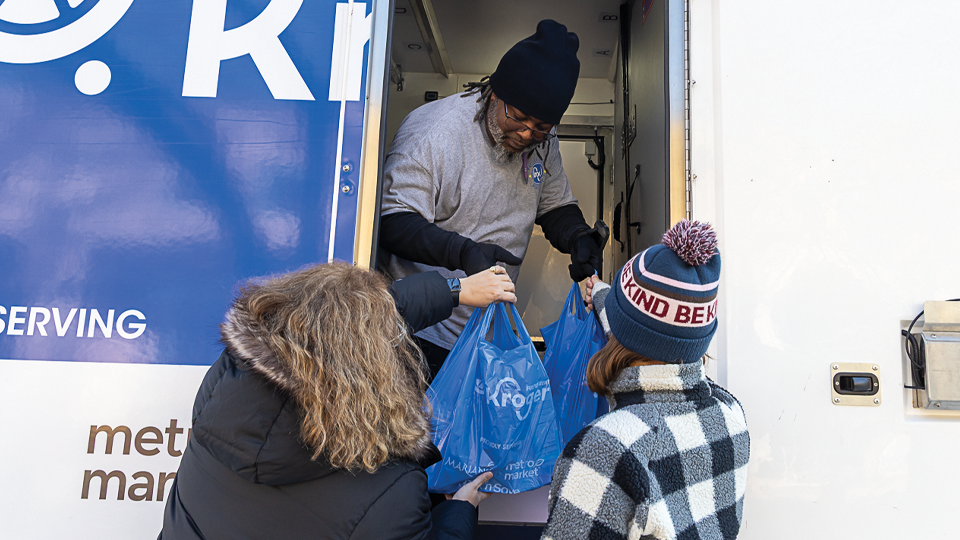
MATC offers students Kroger Delivery of groceries at the Downtown Milwaukee Campus
Emergency Assistance Grants Free On-Campus Grocery Delivery
BreAnna Jones has always been super smart and super busy. In the fall of 2024, Jones, who is planning to transfer to the University of Wisconsin-Milwaukee and become an elementary school science teacher, was taking a full load of classes and working on campus. She was at MATC at least eight hours almost every weekday.
So she made a smart move by ordering her groceries online once a week and having them delivered to the Downtown Milwaukee Campus, where she can pick them up when she’s ready.
“Life is busy,” Jones said. “Being able to order my groceries and not have to make time to go to the store helps a lot. Being able to pick them up after my classes and take them home helps even more. It just makes life a great deal easier.”
In the summer of 2024, MATC became one of the first colleges in the region to receive Kroger Delivery on campus free of charge.
“Our organizations have a shared belief that fresh food should be available and accessible to everyone,” said Emilie Williamson, corporate affairs manager for Kroger-owned Pick ‘n Save and Metro Market. “In collaboration with MATC, we can expand food access, meeting students where they are — on campus.”
The service is available to all MATC students, faculty, and staff, and is “ideal for students who don’t live near a grocery store, who have children, which can make going to get groceries a challenge, and neurodivergent students who can find stores daunting,” said Sara Cappaert, MATC’s manager of scholarships.
The delivery service is just another reason why Jones believes she made the right decision when she chose MATC.
“There are an amazing amount of resources on campus,” she said.
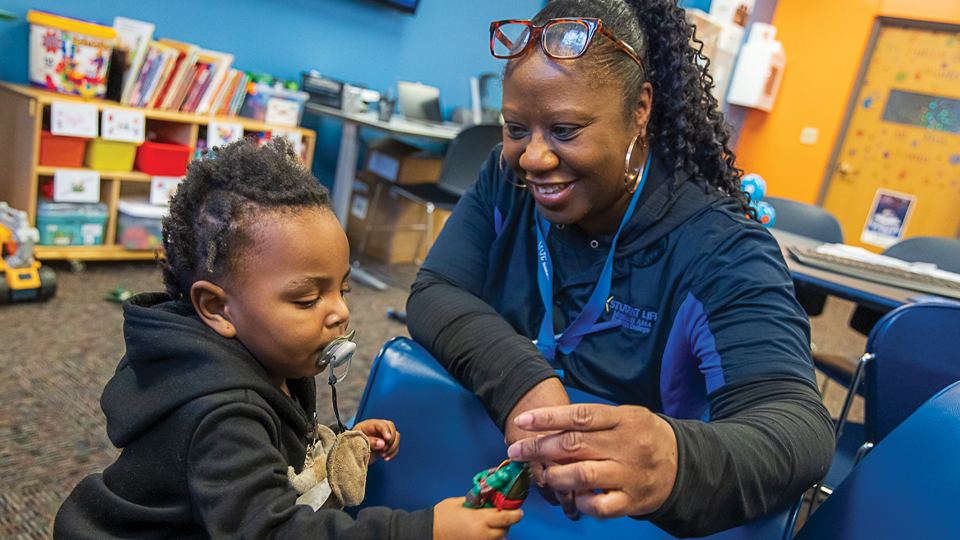
MATC offers students child care services at the Downtown Milwaukee Campus
Drop-in Child Care
In July 2024, MATC became one of the first community colleges in the nation to open a free, drop-in, short-term childcare center. Located at the Downtown Milwaukee Campus, Little Stormers Village is open to current and prospective MATC students. They can drop off children between the ages of 6 months and 10 years old for up to three hours to meet with tutors, advisors, retention coaches, and financial aid administrators; take a placement test; or attend an orientation.
The center is staffed by at least two workers every day, said Tamara Allen, who supervises the operation of Little Stormers Village. The center has specific activities and areas for children of different ages and safety measures in place to ensure children are protected and can be picked up only by authorized parents or guardians.
“Child care has been identified as a real gap for student parents,” Allen said. “Community college students usually have so many responsibilities: class, work, family. We’re trying to provide a little bit of help with that.”
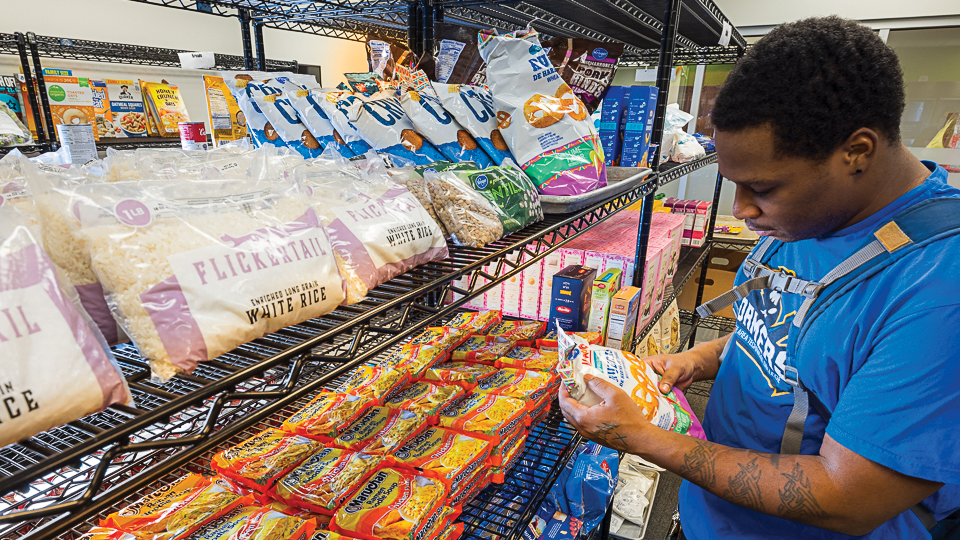
MATC offers students a market-style food pantry, at the Downtown Milwaukee Campus
Food Pantries
Maria Dominguez always has a lot on her plate, but sometimes she doesn’t have a lot in the pantry. While taking classes in the Medical Interpreter program, she was working part-time and raising two children. Money could be tight, so the food pantry at the Education Center at Walker’s Square was a godsend for her and her family.
“This is a real stress relief,” said Dominguez, who came to the United States from Mexico 20 years ago. “With the food pantry, this can help us save money for other things.”
MATC has food pantries at Walker’s Square and all four campus locations (Downtown Milwaukee, Mequon, Oak Creek, and West Allis). The first pantry opened downtown in 2021, with openings at other college locations shortly thereafter.
“Food insecurity is a huge concern,” said Haley Weber, manager of the college’s Student Resource Center. “Anecdotally, students often speak about having to choose between food and gas.”
Feeding America supplies the pantries with essential foods, beverages, and snacks, and the college orders almost 1,500 pounds of food each week, according to Weber.
“Students often come back weekly to supplement what they can’t afford, and many utilize the pantry to support their families,” Weber said.
In addition to essentials and snacks, the pantry at the Downtown Campus is stocked with meals prepared by Culinary Arts students in chef Paul Carrier’s Food Advocacy course. The meals are simple, comfort food intended to feed as many students as possible and packaged in black carryout boxes.
“The people at the food pantry tell us these meals are the first thing to go,” said student Joey Naum. “It’s heartwarming to see how many people we help every day.”
With the food pantry at Walker’s Square, students won’t have to find time to travel to the downtown pantry, said Anallely Guadarrama, an MATC student studying to be a bilingual office assistant and who works part-time at Walker’s Square.
“Many students come only here and have asked us about groceries,” said Guadarrama, originally from Villa Guerrero in Mexico and the mother of two children. “Now we have something here for them. This will help so many so much.”
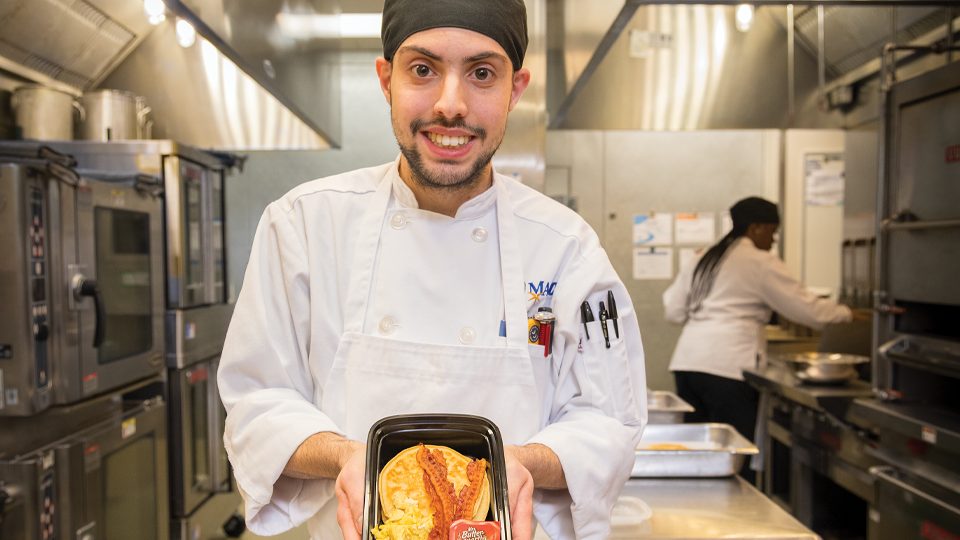
“The people at the food pantry tell us these meals are the first thing to go. It’s heartwarming to see how many people we help every day.”
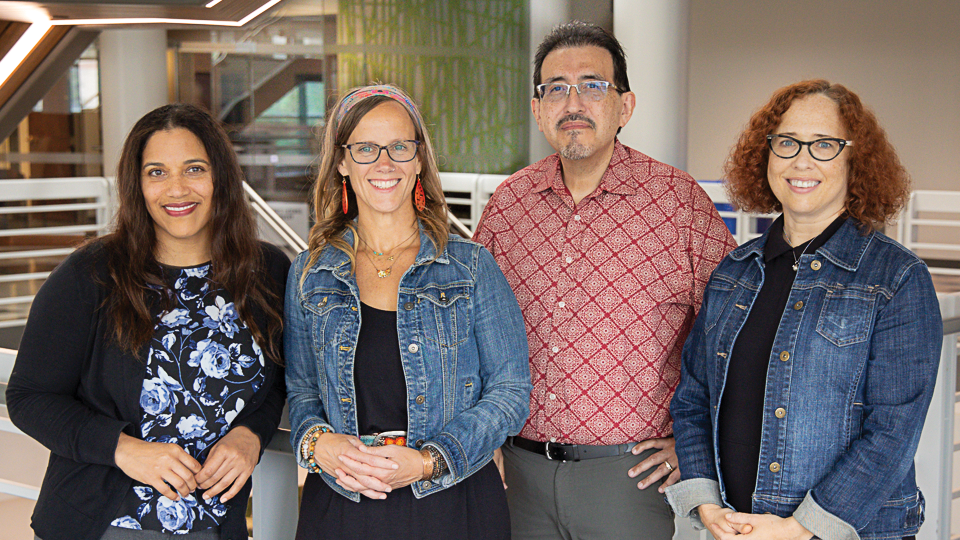
MATC offers students mental health counseling with the CAPS team at the Downtown Milwaukee Campus.
Mental Health Wellness
One student simply could not sleep, lying awake for hours in the middle of the night, worrying about money. Another confided to a staff member he felt so stressed, so frustrated, and so overwhelmed that he was considering suicide.
For students, faculty, and staff, balancing work, classes, and personal lives can take a toll. Aggravations, frustrations, and darker thoughts can occur any time, day or night.
The Counseling and Psychological Services (CAPS) team offers free and confidential counseling in person, over the phone, or virtually, as well as resources and referrals to anyone experiencing life challenges and any kind of mental health concerns that are affecting their personal lives, academics, and general well-being. CAPS has licensed professional counselors who provide safe, non-judgmental spaces where students and employees can talk, share, and process feelings, identify options, set goals, and strengthen coping skills.
Quality mental health support services are essential at a technical college, where many students are older, might have children, and could be returning to school after long pauses, said Nicole Wheatley, Ph.D., one of the college’s licensed professional counselors.
While some students struggle with coursework or worry about their futures, others deal with issues like financial stress, housing issues, food insecurity, transportation access, and domestic abuse, Dr. Wheatley said. When these challenges arise, counselors provide support 24 hours a day, seven days a week.
“I see an amazing amount of resilience with our students. They have a strength,” Dr. Wheatley said. “Hope is a driving force for so many people here. Many students are trying to create a better financial future for themselves and their families. But many times there can be stress and pressure that comes with that.”
No problem and no issue are too small to talk to someone about, said Kathryn Cunningham, another of the college’s counselors.
“Our students show an amazing amount of resilience,” Dr. Wheatley shared. “Many are trying to create a better financial future for themselves and their families, but this often comes with significant stress and pressure.”
“We’re not here to tell people what to do. We’re here to help them process everything and figure out the best course of action,” Dr. Wheatley said. CAPS counselors are available 24/7 to provide support when it’s needed most.
Kathryn Cunningham, another of the college's counselors, emphasized, “No problem or issue is too small to talk about. If something is bothering you enough to interfere with your academic progress or other important parts of your life, that’s the time to seek support. Early intervention often prevents issues from escalating.”
“If something is bothering you enough that it’s interfering with your academic progress or other important aspects of your life, that’s the time to get support and you deserve to get that support,” Cunningham said. “Many times, early intervention prevents escalation.”
“We’re not here to tell people what to do. We’re here to help them process everything and figure out the best thing for them to do,” Dr. Wheatley said. “We’re here to provide a safe, private place to get the help you need to do that.”
“I see an amazing amount of resilience with our students. They have a strength.”
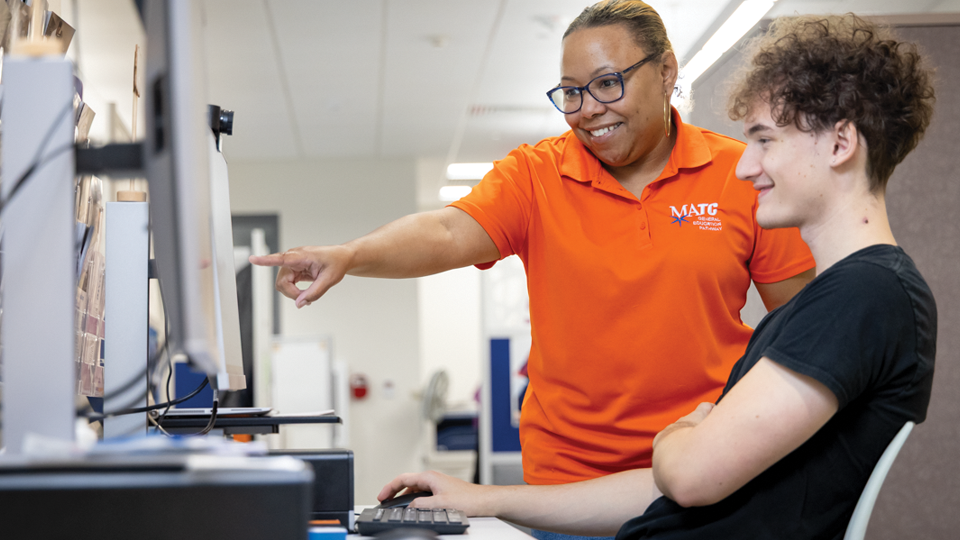
MATC offers students tutoring at the Downtown Milwaukee Campus.
Academic Assistance
Suzanne Seilers got serious about college later in life. As a teenager, she had an artistic soul, an eye for fashion, and an ear for music, so she briefly attended a few theater courses at the University of Wisconsin-Milwaukee after graduating from Cedarburg High School in 1979.“It wasn’t for me, and I didn’t do well,” she admitted. “But back then, I didn’t really have any support systems.”
More than 40 years later when she decided to go back to school, she found the support she needed to succeed at MATC, where advisors guide students to graduation.
As an older student back in school after decades away, Seilers needed extra help. She worked with her Community and Human Services Academic and Career Pathway advisor, Maggie Ehlert, and spoke almost weekly to her retention coach, Kim Blackwell, to schedule classes, manage her financial aid, and stay on track. With their help, Seilers earned an associate degree in the Human Service Associate program.
“I could always get a hold of Kim and Maggie,” Seilers said. “I really needed these resources, especially after not being in school for all those years. Once I started, I decided I was going to finish. I wasn’t going to quit.”
Also benefiting from sound advice was Jonathan Perez, who wanted to fix cars for a living. He planned to enroll in the Automotive Technology program but switched his attention to the Diesel and Powertrain Servicing program. His advisor, Erik Riley, helped him every step of the way. Perez got into the program. A few days later, he received a $1,000 scholarship through the MATC Foundation funded by All Within My Hands, an initiative started by the rock band Metallica to help students in “heavy metal” fields.
Perez graduated and quickly got a job in the field, Riley said.
“Jonathan never hesitated to connect with the Pathway when needed and never let challenges in the process derail him from reaching his goals,” Riley recalled. “Thanks to his persistence, Jonathan was able to take full advantage of his educational experience.”
To donate to the MATC Foundation’s Student Emergency Assistance Fund, visit matc.edu/donate.

